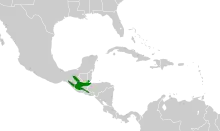Guatemalan tyrannulet
The Guatemalan tyrannulet or paltry tyrannulet (Zimmerius vilissimus), is a very small passerine bird in the tyrant flycatcher family. It occurs in southern Mexico, Guatemala, El Salvador and southern Belize.
| Guatemalan tyrannulet | |
|---|---|
| Scientific classification | |
| Domain: | Eukaryota |
| Kingdom: | Animalia |
| Phylum: | Chordata |
| Clade: | Dinosauria |
| Class: | Aves |
| Order: | Passeriformes |
| Family: | Tyrannidae |
| Genus: | Zimmerius |
| Species: | Z. vilissimus |
| Binomial name | |
| Zimmerius vilissimus (Sclater, PL & Salvin, 1859) | |
 | |
It was formerly considered to be conspecific with the mistletoe tyrannulet (Zimmerius parvus).[2]
The Guatemalan tyrannulet is a common bird from the lowlands to 2,600 m (8,500 ft) altitude, mainly in humid regions. It can be found in forests, second growth, pasture and plantations with trees, and shady gardens.
The nest is roughly spherical with a side entrance and made of mosses and lined with plant fibre. It may be built amongst mosses or dangling epiphyte roots, inside a large dead leaf or inside or below a yellow-olive flycatcher's pendant nest. It is constructed 2–15 m above the ground. The typical clutch is two rufous-marked dull white eggs. Incubation by the female is 14–15 days to hatching, with another 17 days to fledging.
The Guatemalan tyrannulet is 11–12 cm (4.3–4.7 in) in length. The upperparts are olive-green other than a dull grey crown to the head and grey supercilia. The wings are blackish with yellow feather edging but no wing bars, and the longish tail is dusky. The throat and breast are off-white with grey streaking, the belly is white, and the flanks have a dull yellow-green cast. The long legs are blackish. The sexes are similar, but young birds have an olive crown, yellow-tinged supercilia and broader but paler wing bars. The call is a loud peeer and the dawn song is a plaintive yer-de-dee, yer-de-dee.
The Guatemalan tyrannulet is an active bird, usually seen alone or in pairs high in trees. It eats mainly mistletoe, but also other berries and small insects, all taken in flight in short sallies from a perch.
References
- BirdLife International (2017). "Zimmerius vilissimus". IUCN Red List of Threatened Species. 2017: e.T103680824A112299652. doi:10.2305/IUCN.UK.2017-1.RLTS.T103680824A112299652.en. Retrieved 12 November 2021.
- Gill, Frank; Donsker, David, eds. (2017). "Tyrant flycatchers". World Bird List Version 7.3. International Ornithologists' Union. Retrieved 9 January 2018.
Further reading
- Skutch, Alexander F. (1960). "Paltry tyranniscus" (PDF). Life Histories of Central American Birds II. Pacific Coast Avifauna, Number 34. Berkeley, California: Cooper Ornithological Society. pp. 465–474.
External links
- Photo; Article Guatemalan Study area
- "Paltry tyrannulet" photo gallery VIREO
